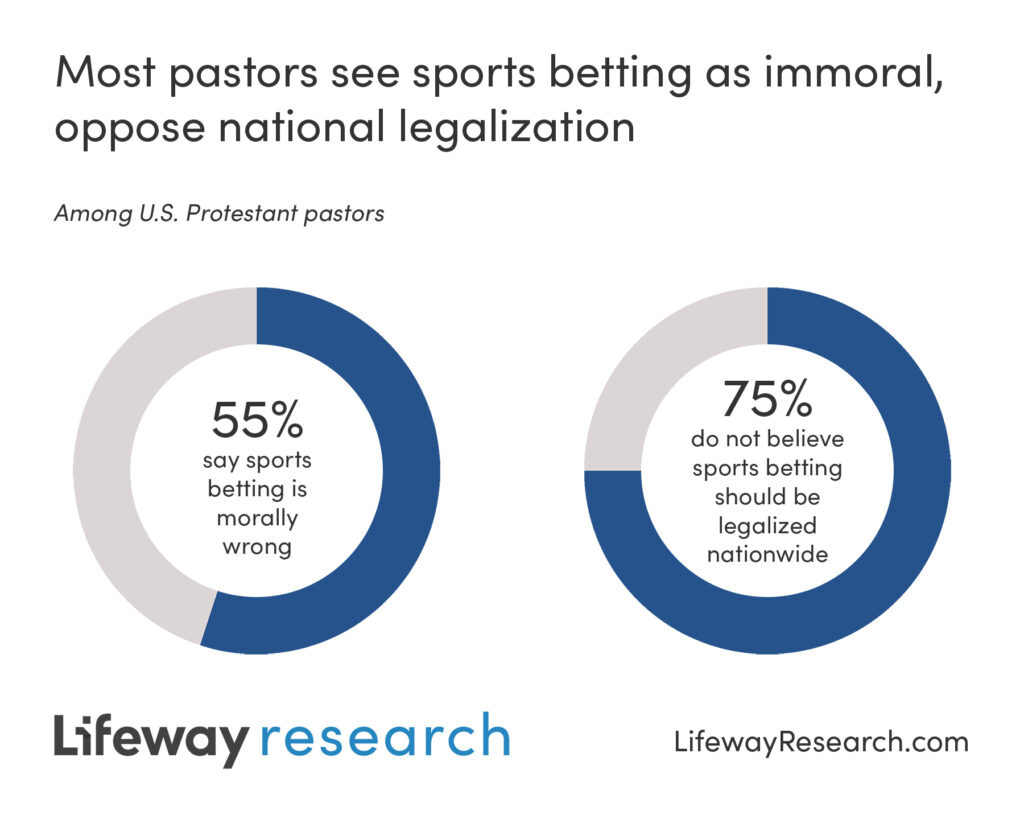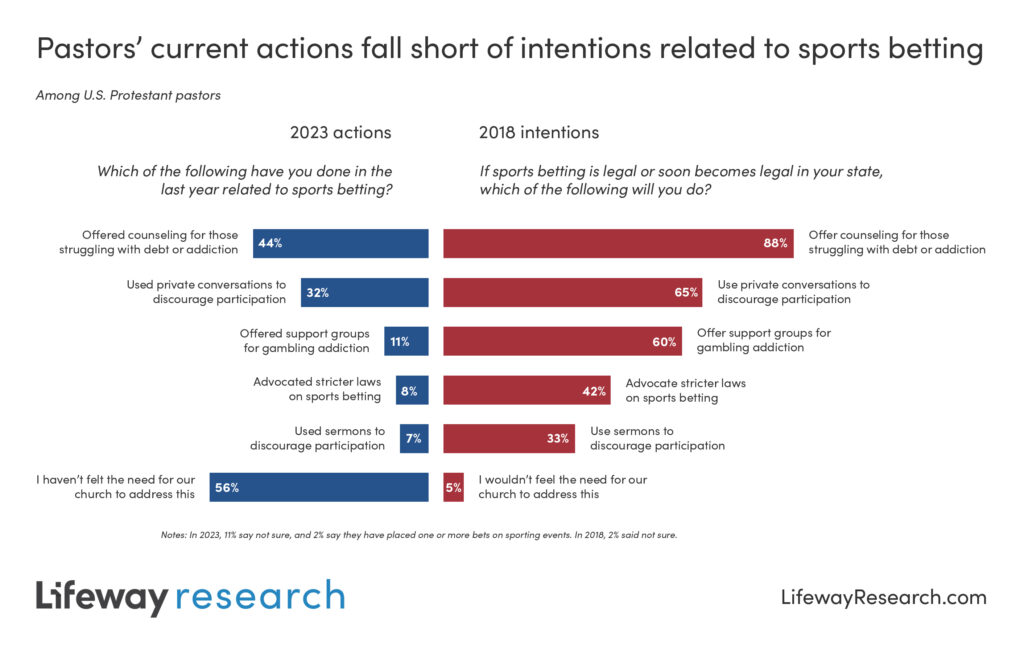
Despite its legalization across many states, U.S. Protestant pastors remain opposed to sports betting, but they’re not doing much about it.
By Aaron Earls
With the Super Bowl this weekend, don’t expect many pastors to place a bet on Kansas City or San Francisco to win the game, but a few may have more than a rooting interest riding on the game.
Despite its legalization across many states, U.S. Protestant pastors remain opposed to sports gambling, but they’re not doing much about it, according to a Lifeway Research study. Few pastors (13%) favor legalizing sports betting nationwide and most (55%) say the practice is morally wrong.
“Anything can happen in sports, and many Americans want the same allure of an unexpected win in sports to translate into an unexpected financial windfall,” said Scott McConnell, executive director of Lifeway Research. “Most pastors see moral hazards in sports betting and believe American society would be better off without it.”
Pastoral opposition
A majority of pastors (55%) believe betting on sports is morally wrong, including 33% who strongly agree. Around a third (35%) disagree, while 10% aren’t sure.
Evangelical pastors (62%) are more likely than mainline pastors (50%) to see sports gambling as morally wrong. Baptist (65%) and non-denominational pastors (63%) are more likely than those at Lutheran (42%) or Presbyterian/Reformed churches (46%) to agree it is wrong.
While there is some difference of opinion over the morality of sports betting, almost all pastors agree on what the legal status should be. Few (13%) agree sports betting should be legalized across the country, including 2% who strongly agree. Three in 4 pastors (75%) oppose nationwide legalization, and 13% aren’t sure.
Younger pastors, those aged 18-44, are the most likely to support making sports betting legal across the U.S. (20%) and the least likely to oppose those efforts (64%). White pastors (76%) are more likely to oppose legalization than Black pastors (63%). Pastors in the South (78%) and Midwest (75%) are also more likely to disagree with legalizing sports gambling nationwide than those in the West (64%).
Again, evangelical pastors are more likely to oppose gambling than their mainline counterparts, with 80% of evangelical pastors compared to 64% of mainline pastors opposing legalization across the country. Pentecostals (85%) and Baptists (83%) are more likely to disagree with legalizing sports betting than Methodist (72%), Presbyterian/Reformed (71%), Lutheran (66%) and non-denominational pastors (66%).

The overall numbers are similar to a 2018 Lifeway Research study of U.S. Protestant pastors conducted shortly after a Supreme Court ruling opened the door for an expansion of sports gambling across the country. In late summer 2018, 59% of pastors felt sports betting was morally wrong, and 12% thought it should be legal nationwide.
“While there are no statements in the Bible saying, ‘don’t place a bet on your team,’ pastors see gambling as violating numerous biblical principles,” said McConnell. “The Bible points to God as sovereign over all things, while gambling trusts in chance. The Bible considers coveting and materialism sins, while gambling promotes these vices. The Bible describes God’s hatred for pride, while ‘putting your money where your mouth is’ reflects arrogance over sports outcomes outside your control. Biblical stewardship of your resources and putting your talents to work are the opposite of a get-rich-quick pursuit that happens at the expense of others.”
Pastoral apathy
Currently, some form of sports gambling is legal in more than 30 states and Washington D.C. But few pastors see it as an issue for them or their churches to address. This demonstrates a shift from their stated intentions in 2018, a few months after sports betting became a legal possibility across the country.
In 2018, pastors were asked: “If sports betting is legal or soon becomes legal in your state, which of the following will your church do?” Almost 9 in 10 (88%) said they would offer counseling for those struggling with addiction and debt. Two in 3 (65%) said they would have private conversations to discourage participation, and 60% would offer support groups for gambling addictions. Another 42% said they would advocate for stricter laws on sports betting. And 33% planned to use sermons to discourage participation. A little more than five years ago, 5% of U.S. Protestant pastors said they wouldn’t feel the need for their church to address the issue.

Today, few of those stated ambitions have been realized and most pastors say they don’t feel like they need to do anything about sports betting. Within the last year, 44% of pastors say they’ve offered counseling for those struggling with debt or addiction and 32% have used private conversations to discourage participation in sports betting. Few say they have offered support groups for gambling addiction (11%), advocated for stricter laws on sports betting (8%) or used sermons to discourage participation (7%). Most pastors (56%) now say they haven’t felt the need for their church to address the issue in the last year.
Asked directly about their own participation, 2% of U.S. Protestant pastors say they have placed one or more bets on sporting events in the last year.
“Pastors are still not supportive of sports betting, but their plan for responding has changed in the last six years,” said McConnell. “Pastors’ 2018 intentions were to fight to keep our culture from hurting itself by lowering a standard. Now that most states have legalized sports betting, pastors appear less interested in focusing on this behavior. Many will likely follow through on their intentions if a specific need arises, but the reality is that intentions are easier than actions.”
Baptist and Methodist pastors are often the ones most likely to be involved with the issue. Baptists are among the most likely to say they’ve used sermons (13%) and private conversations (39%) to discourage participation. Methodists are among the most likely to have offered support groups for gambling addiction (16%). Both Methodists (14%) and Baptists (12%) are among the most likely to say they’ve advocated for stricter laws on sports betting in the past year and to say they’ve offered counseling for those struggling with debt or addiction (Methodists 48%, Baptist 46%).
Pastors 65 and older (49%) are less likely than those 18 to 44 (61%) and 55 to 64 (59%) to say they haven’t felt the need to address sports betting. Lutherans (71%) and Presbyterian/Reformed (67%) are more likely than Methodists (53%), Baptists (47%) and Pentecostals (42%) to believe it’s not necessary to get involved.
Lifeway Research studies can be used and referenced in news articles freely. This news release can also be republished in its entirety on other websites and in other publications without obtaining permission.

For more information, view the complete report.
Methodology
The phone survey of 1,004 Protestant pastors was conducted Aug. 29, 2023 – Sep. 20, 2023. The calling list was a stratified random sample, drawn from a list of all Protestant churches. Quotas were used for church size. Each interview was conducted with the senior pastor, minister or priest at the church. Responses were weighted by region and church size to reflect the population more accurately. The completed sample is 1,004 surveys. The sample provides 95% confidence that the sampling error does not exceed plus or minus 3.2%. This margin of error accounts for the effect of weighting. Margins of error are higher in sub-groups. Comparisons are made to a phone survey of 1,000 Protestant pastors conducted August 29 – September 11, 2018.










